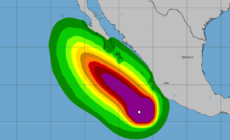-
‘Shut down the Blue Jays’ offense’ – Derek Jeter on how Yankees can overcome 0-2 deficit in ALDS - 3 mins ago
-
Gaza ceasefire negotiations to resume amid new hope for peace deal - 15 mins ago
-
Threats to TikTok workers are traced to L.A. man; standoff follows - 19 mins ago
-
McLaren boss makes strong statement on Norris-Piastri contact - 29 mins ago
-
Ja'Marr Chase makes incredible TD grab as Bengals close gap on Lions - 45 mins ago
-
Kyle Busch Breaks Silence on Crew Chief Change Amid Performance Slump - about 1 hour ago
-
George Springer's 20th career playoff home run increases Blue Jays' lead over Yankees - about 1 hour ago
-
Amy Schumer, 44, shows off impressive weight loss on social media - about 1 hour ago
-
Supreme Court Kicks Off New Term: What to Know - 2 hours ago
-
Priscilla strengthens into a hurricane in the Pacific. Maps show its path. - 2 hours ago
As good as your word or perhaps even better
The good thing – one of the good things – about being a wordsmith is that, unlike blacksmiths, locksmiths, gunsmiths, coppersmiths, goldsmiths, silversmiths and so on – you can be entirely self-created and don’t have to go to the bother of studying somewhere for years and passing difficult examinations. Rather than shoeing a frisky horse, unlocking a door for someone who’s lost their keys or fashioning a hand weapon that will blow a hole straight through someone no-questions-asked, you can simply impress with your way with words.
The “Dictionary of Fine Distinctions” is here to help those bods who might benefit from greater erudition when it comes to that wondrous but tricky beast, the English language. For instance, although it might not seem absolutely necessary to know the difference between a swamp and a marsh, even if you have fallen neck-deep into something extremely wet and are having a lot of trouble getting out again, you never know when it could help.
Likewise, if during that stroll in the country you avoid the swamp/marsh but get bitten on the bum by a snake, be aware that herpetologists (as you know, those zoologists who focus on studying amphibians and reptiles) will recoil in horror if you confuse venomous and poisonous. Dinner-table raconteurs may simply say they were bitten on the ass by an asp.
Eli Burnstein aims to guide us with accuracy/precision (there is a fine distinction, explained) through the maze/labyrinth that is English. However, his book is a light-hearted affair, a fun and quick read over 208 pages and as evidenced by the whimsical drawnings that accompany the definitions. The unparalleled 20-volume, 22,000-page Oxford English Dictionary it ain’t.
Of course, any nit should be adept at cord/chord, cover-up/cover up, diffuse/defuse, complementary/complimentary, descendent/descendant, alternate/alternative, and the many other etymological traps. These are elemental, and anyone who screws them up should be taken outside, placed up against a wall and shot. If confused, turn to the Oxford.
Nonetheless, come the day when you need to know the difference between a bay, cove and gulf, or between a tyrant, despot, autocrat and dictator, turn to Burnstein’s fun book. Who among us hasn’t dithered over whether it’s strategy or tactics, or whether we are headed to a gala or a ball, or if those citrus fruits are actually mandarins, clementines or tangerines?
Consider that such a solid command of the language might save you from a multi-million lawsuit or a terrible fight with your spouse over some stupid misunderstanding. Can there truly be journalists – professional wordsmiths – who can’t tell between a typeface and a font? There are editors (no names mentioned) who consider these things hanging offences.
English is the global lingua franca, thanks to the sun never setting on the jolly old empire. It is estimated that some 1.5 billion people speak it worldwide, and for 390 million-plus of them it is their native language. English is dominant in the United Kingdom, the United States, Canada, Australia, New Zealand, Ireland and various island nations in the Caribbean Sea and the Pacific Ocean. It is an official language of India, the Philippines, Singapore and many countries in sub-Saharan Africa, including South Africa. Learn the lingo.
Its roots are in the West Germanic language spoken by the Anglo-Saxons who settled in Britain in the 5th century. The earliest form of English was known as Old English, which was spoken until around the 11th century. Then we had Middle English and Modern English. Many phrases and terms come from the Bible, such as “Let there be light”, “Forbidden fruit”, “Bite the dust”, “See eye to eye”, “Rise and shine” and “Drop in a bucket”. William Shakespeare was another major contributor, coining words such as “swagger”, “lonely”, “eyeball”, “bedazzled” and “generous”, and contributing phrases such as “Come what come may”, “For goodness’ sake” and “Neither here nor there”. Lots of words have been borrowed from elsewhere, think tsunami, tycoon and karaoke (Japanese), shampoo, pyjamas and jungle (Hindi), algebra and safari (Arabic), loot, guru and yoga (Sanskrit) and many many more (robot, ballet, pretzel, banana, czar, chauffeur, etc, etc). Simply scores are French.
One of our very favourite wordsmiths was the Australian writer and television presenter Clive James, who described muscleman Arnold Schwarzenegger as like “a brown condom full of walnuts”. A humbler Australian, a compositor on a newspaper, once sagely explained that women are crazy because they have “different waterworks”. Aussies, of course, have many idioms of their own, such as “rare as rocking horse shit” and “flat out like a lizard in the sun”.
Another of our heroes is Noël Coward, who in his play “Blithe Spirit”, about a troublesome ghost, wrote the memorable line that “Surely even an ectoplasmic manifestation has the right to expect a little of the milk of human kindness?” Asked once about God, Coward replied (no doubt in that clipped voice) that “We’ve never been properly introduced”.
Buy a notebook, collect gems. In a collection of stories from the decades of classic pulp fiction we noted “If she was a ranch they’d call her the Bar Nothing”, and a car chase so fast and dangerous “They burned a hole in the night that the night would never repair”. Singer Buster Brown had a song titled “Is You Is Or Is You Ain’t My Baby”. US radio DJ Dewey Phillips advised ”Get off the turntable, Mabel, you’re too old to be going round with musicians.”
Wow, those are brilliant. Cor blimey. Boy oh boy. Stone the crows. Flipping heck. Jeepers. Gee whiz. Yikes. Lumme (that’s “Lord love me”). English in full flow. Synonyms, homonyms, solecisms, hyperbole, onomotopoeia, double meanings, double entendres, double negatives, idioms, colloquialisms, slang, proverbs. jargon, jokes, quotes, puns, anecdotes, insults, ripostes, malapropisms, spoonerisms, euphemisms, exclamations, epigrams, schadenfreude, obscenity, vulgarity, profanity, sesquipedalianism. It can be Wilde out there in language land!
Recently, while pondering the word anthropomorphism, namely the giving of human traits to our animal friends or to objects, there then arose an oddity of onomotopoeia, you know, that word representing a sound. Came the thought that while cows have always mooed, pigs can be relied on to oink, cats to meouw, chickens to cluck, doors to creak, horns to honk, etc, we believed we had observed a strange trend in print lately where frogs no longer “croak”, as we always thought they did, but go “ribbit” instead. However, further investigation shows we may have been wrong all the time, that in fact frogs do ribbit and it is toads that croak.
I’ll be blowed. Live and learn. But back to the “Dictionary of Fine Distinctions”. How can you not love words? They’re exciting, stimulating. Burnstein tells whether it is gully or ravine, parable or fable, emoji or emoticon. Are you confident about identifying a joint, a blunt and a spliff? A flat white and a cappuccino? How about distinguishing between a barouche, a hansom and a troika? Hue, tint, shade and tone? Pidgin/creole, persuade/convince.
The author is a Canadian humourist, copywriter and occasional organiser of spelling bees. He’ll surely forgive if we stray from his expertise, once again, and recall some word-spinning that stuck in the mind, such as “Excuse me sir, I think you take me for someone who gives a shit”, “My over is whelmed and my flabber is gasted, “You don’t look at the mantelpiece when you poke the fire” and “The female of the speaches is deadlier than the male”.
Thanks to Burnstein we know that hay is the greenish stuff which farm animals eat, while straw is the yellowish stuff on which farm animals sleep. And accuracy refers to how close you are to the correct answer but precision refers to how closely or finely you’re measuring.
Here is a diverting book to help us be linguistically accurate. It’s entertaining in its way (and please note the correct use here of “it’s” and “its” – there are dumbos who still get it wrong).
Source link































